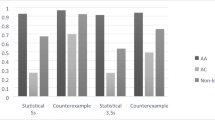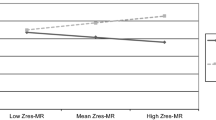Abstract
We administered the Scrambled Sentences Test (SST; R. M. Wenzlaff, 1993), a measure of cognitive processing bias, to a large sample of college students at Time 1. Participants completed a portion of the SST under cognitive load (holding a six-digit number in memory) and a portion without load. At Time 2, 18–28 months later, we conducted diagnostic interviews with a subset of the original participants. As expected, SST scores (proportion of negative solutions) in the cognitive load condition predicted diagnoses of major depression during an 18–28 month follow-up period, even after controlling for self-reported Time 1 depression symptoms and worst lifetime symptoms. No significant prediction of depression was obtained using SST scores from the no-load portion of the task.
Similar content being viewed by others
References
Alloy, L. B., Abramson, L. Y., & Francis, E. L. (1999). Do negative cognitive styles confer vulnerability to depression? Current Directions in Psychological Science, 8, 128-132.
Beck, A. T. (1967). Depression: Clinical, experimental, and theoretical aspects. New York: Harper & Row.
Beck, A. T., Ward, C. H., Mendelson, M., Mock, J., & Erbaugh, J. (1961). An inventory for measuring depression. Archives of General Psychiatry, 4, 561-571.
Bumberry, W., Oliver, J., & McClure, J. (1978). Validation of the Beck Depression Inventory in a university population using psychiatric estimate as the criterion. Journal of Consulting and Clinical Psychology, 46, 150-155.
Eaves, G., & Rush, A. J. (1984). Cognitive patterns in symptomatic and remitted unipolar major depression. Journal of Abnormal Psychology, 93, 31-40.
Fennell, M. J. V., & Campbell, E. A. (1984). The Cognitions Questionnaire: Specific thinking errors in depression. British Journal of Clinical Psychology, 23, 81-92.
Galambos, N. L., Leadbeater, B. J., & Vitunski, E. T. (2001). Gender differences in and predictors of depression in Canadian adolescents: A four-year longitudinal study. Paper presented at the annual meeting of the American Psychological Association, San Francisco, CA.
Galambos, N. L., Leadbeater, B. J., & Barker, E. T. (in press). Gender differences in and risk factors for depression in adolescence: A four-year longitudinal study. International Journal of Behavioural Development.
Gilboa, E., & Gotlib, I. H. (1997). Cognitive biases and affect persistence in previously dysphoric and never-dysphoric individuals. Cognition and Emotion, 11(5/6), 517-538.
Gotlib, I. H., & Cane, D. B. (1987). Construct accessibility and clinical depression: A longitudinal investigation. Journal of Abnormal Psychology, 96, 199-204.
Gotlib, I. H., & Krasnoperova, E. (1998). Biased information processing as a vulnerability factor for depression. Behavior Therapy, 29, 603-617.
Hamilton, E. W., & Abramson, L. Y. (1983). Cognitive patterns and major depressive disorder: A longitudinal study in a hospital setting. Journal of Abnormal Psychology, 92, 173-184.
Hammen, C. (1980). Depression in college students: Beyond the Beck Depression Inventory. Journal of Consulting and Clinical Psychology, 48, 126-128.
Hedlund, S., & Rude, S. (1995). Evidence of latent depressive schemata in formerly depressed indivi-duals. Journal of Abnormal Psychology, 104(3), 517-525.
Hollon, S. D., Kendall, P. C., & Lumry, A. (1986). Specificity of depressotypic cognitions in clinical depression. Journal of Abnormal Psychology, 95, 52-59.
Ingram, R. E., Bernet, C. Z., & McLaughlin, S. C. (1994). Attention allocation processes in depressed individuals. Cognitive Therapy and Research, 18, 317-332.
Ingram, R. E., Miranda, J., & Segal, Z. V. (1998). Cognitive vulnerability to depression. NY: Guilford Press.
Judd, L. L. (1997). The clinical course of uniploar major depressive disorders. Archives of General Psychiatry, 54, 989-991.
Kessler, R. C., McGonagle, K. A., Zhao, S., Nelson, C. B., Hughes, M., Eshleman, S., Witcthen, H. O., & Kenderl, K. S. (1994). Lifetime and 12-month prevalence of DSM-III-R psychiatric disorders in the United States: Results from the national comorbidity survey. Archives of General Psychiatry, 51, 8-19.
Krantz, S. E., & Rude, S. S. (1984). Depressive attributions: Selection of different causes or assignment of dimensional meanings? Journal of Personality and Social Psychology, 47, 193-203.
Lewinsohn, P. M., Allen, N. B., Seeley, J. R., & Gotlib, I. H. (1999). First onset versus recurrence of depression: Differential processes of psychosocial risk. Journal of Abnormal Psychology, 108, 483-489.
Lewinsohn, P. M., Steinmetz, L., Larson, D. W., & Franklin, J. (1981). Depression-related cognitions: Antecedents or consequence? Journal of Abnormal Psychology, 90, 213-219.
Marcel, A. J. (1983). Conscious and unconscious perception: An approach to the relations between phenomenal experience and perceptual processes. Cognitive Psychology, 15, 238-300.
Metalsky, G., Abramson, L. Y., Seligman, M., Semmel, A., & Peterson, C. (1982). Attributional styles and life events in the classroom: Vulnerabilty and invulnerability to depressive mood reactions. Journal of Personality and Social Psychology, 43(3), 612-617.
Miranda, J., Gross, J. J., Persons, J. B., & Hahn, J. (1998). Mood matters: Negative mood induction activates dysfunctional attitudes in women vulnerable to depression. Cognitive Therapy and Research, 22(4), 363-376.
Miranda, J., & Persons, J. B. (1988). Dysfunctional attitudes are mood-state dependent. Journal of Abnormal Psychology, 97, 76-79.
Miranda, J., & Persons, J. B., Byers, C. N. (1990). Endorsement of dysfunctional beliefs depends on current mood state. Journal of Abnormal Psychology, 99(3), 237-241.
Nisbett, R. E., & Wilson, T. D. (1977). Telling more than we can know: Verbal reports on mental processes. Psychological Review, 84, 231-259.
Paulsen, A. S., Crowe, R. R., Noyes, R., & Pfohl, B. (1988). Reliability of the telephone interview in diagnosing anxiety disorders. Archives of General Psychiatry, 45, 62-63.
Pennebaker, J. W. (1994). Psychological bases of symptom reporting: Perceptual and emotional aspects of chemical sensitivity. Toxicology and Industrial Health, 10, 497-511.
Persons, J. B., & Rao, P. A. (1985). Longitudinal study of cognitions, life events, and depression in psychiatric inpatients. Journal of Abnormal Psychology, 94, 51-63.
Rude, S. S., Covich, J., Jarrold, W., Hedlund, S., & Zentner, M. (2001). Detecting depressive schemata in vulnerable individuals: Questionnaires versus laboratory tasks. Cognitive Therapy and Research, 25(1), 103-116.
Rude, S. S., Krantz, S. E., & Rosenhan, D. L. (1988). Distinguishing the dimensions of valence and belief consistency in depressive and nondepressive information processing. Cognitive Therapy and Research, 12, 391-407.
Rude, S. S., Wenzlaff, R. M., Gibbs, B., Vane, J., & Whitney, T. (2002). Negative processing biases predict subsequent depressive symptoms. Cognition and Emotion, 16(3), 423-440.
Sakado, K., Sato, T., Uehara, T., Sato, S., Kameda, K. (1996). Discriminant validity of the Inventory to Diagnose Depression, Lifetime Version. Acta Psychiatrica Scandinavica, 93, 257-260.
Sato, T., Uehara, T., Sakado, K., Sato, S., Nishioka, K. & Kasahara, Y. (1996). The test—retest reliability of the Inventory to Diagnose Depression, Lifetime Version. Psychopathology, 29, 154-158.
Schneider, W., & Shiffrin, R. M. (1977). Controlled and automatic human information processing: I. Detection, search, and attention. Psychological Review, 84, 1-66.
Segal, Z. V. (1988). Appraisal of the self-schema construct in cognitive models of depression. Psychological Bulletin, 103, 147-162.
Segal, Z. V., Gemar, M., & Williams, S. (1999). Differential cognitive response to a mood challenge following successful cognitive therapy or pharmacotherapy for unipolar depression. Journal of Abnormal Psychology, 108(1), 3-10.
Silverman, J. S., Silverman, J. A., & Eardley, D. A. (1984). Do maladaptive attitudes cause depression? Archives of General Psychiatry, 41, 28-30.
Spitzer, R. L., Williams, J. B. W., Gibbon, M., & First, M. B. (1990). User's guide for the Structured Clinical Interview for the DSM-III-R. Washington, DC: American Psychiatric Press.
Squire, L. R. (1994). Declarative and nondeclarative memory: Multiple brain systems supporting learning and memory. In D. L. Schacter & E. Tulving (Eds.), Memory systems(pp. 203-232). Cambridge, MA: MIT Press.
Onstad, S. I., Torgersen, S., & Kringlen, E. (1991). High interrater reliability for the Structured Clinical Interview for DSM-III-R Axis I (SCID-I). Acta Psychiatrica Scandinavica, 84, 167-173.
Teasdale, J. D. & Dent, J. (1987). Cognitive vulnerability to depression: An investigation of two hypotheses. British Journal of Clinical Psychology, 26, 113-126.
Wells, K. B., Burnham, M. A., Leake, B., & Robins, L. N. (1998). Agreement between face-to-face and telephone-administered versions of the depression section of the NIMH Diagnostic Interview Schedule. Journal of Psychiatric Research, 22, 207-220.
Wenzlaff, R. M. (1988, May). Automatic information processing in depression. Paper presented at the International Conference on Self-Control, Nags Head, NC.
Wenzlaff, R. M. (1993). The mental control of depression: Psychological obstacles to emotional well-being. In D. M. Wegner, & J. W. Pennebaker (Eds.), Handbook of mental control(pp. 239-257). Englewood Cliffs, NJ: Prentice-Hall.
Wenzlaff, R. M., & Bates, D. E. (1998). Unmasking a cognitive vulnerability to depression: How lapses in mental control reveal depressive thinking. Journal of Personality and Social Psychology, 75, 1559-1571.
Wenzlaff, R. M., Rude, S. S., Taylor, C. J., Stultz, C. H., & Sweatt, R. A. (2001). Beneath the veil of thought suppression: Attentional bias and depression risk. Cognition and Emotion, 28(1), 32-40.
Wenzlaff, R. M., & Wegner, D. M. (2000). Thought suppression. Annual Review of Psychology, 51, 59-91.
Wilkinson, I. M., & Blackburn, I. M. (1981). Cognitive style in depressed and recovered depressed patients. British Journal of Clinical Psychology, 20, 283-292.
Williams, J. M. G., & Nulty, D. D. (1986). Construct accessibility, depression and the emotional stroop task: Transient mood or stable structure? Personality and Individual Differences, 7, 485-491.
Zimmerman, M., & Coryell, W. (1987). The Inventory to Diagnose Depression, Lifetime Version. Acta Psychiatrical Scandinavia, 75, 495-499.
Author information
Authors and Affiliations
Corresponding author
Rights and permissions
About this article
Cite this article
Rude, S.S., Valdez, C.R., Odom, S. et al. Negative Cognitive Biases Predict Subsequent Depression. Cognitive Therapy and Research 27, 415–429 (2003). https://doi.org/10.1023/A:1025472413805
Issue Date:
DOI: https://doi.org/10.1023/A:1025472413805




